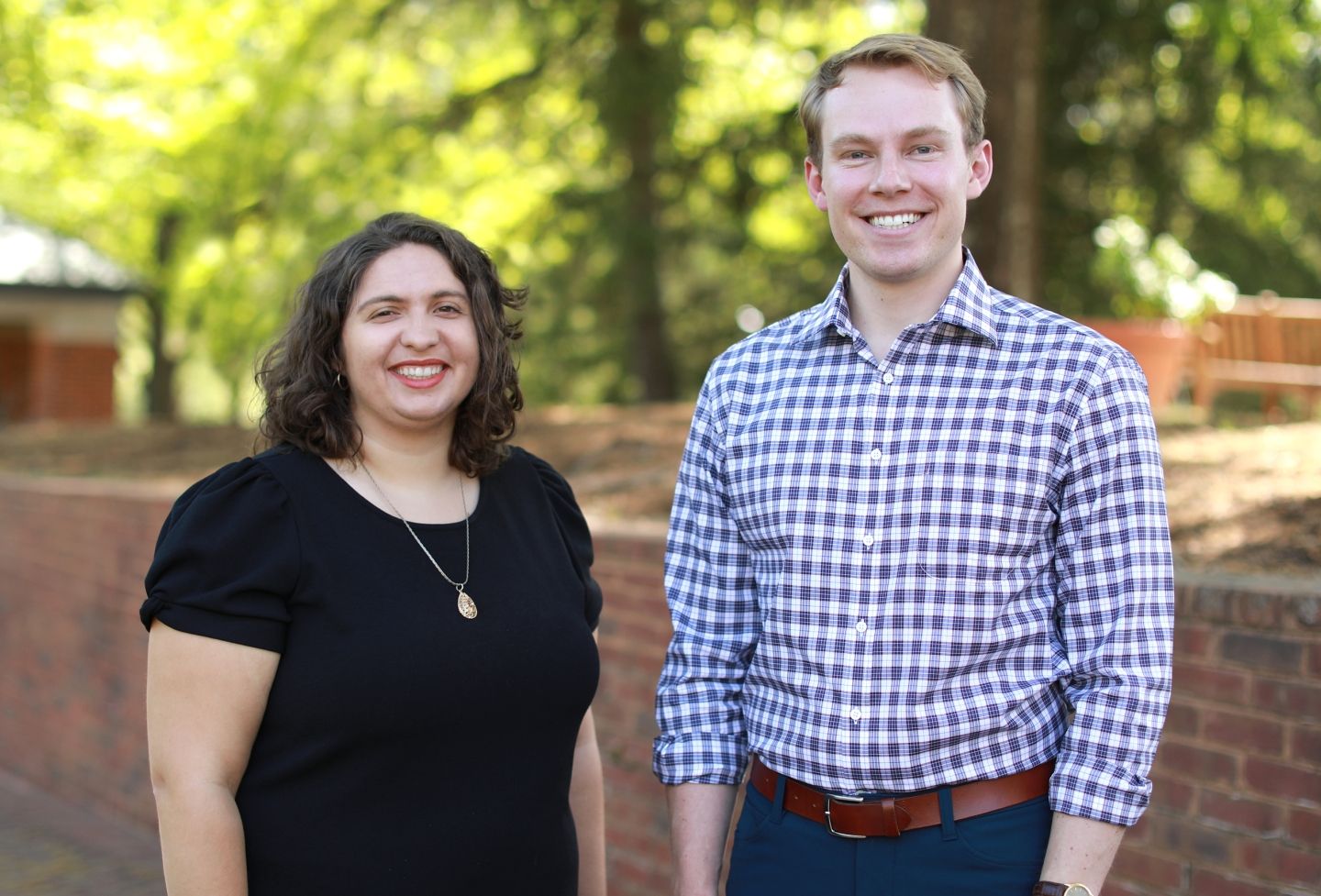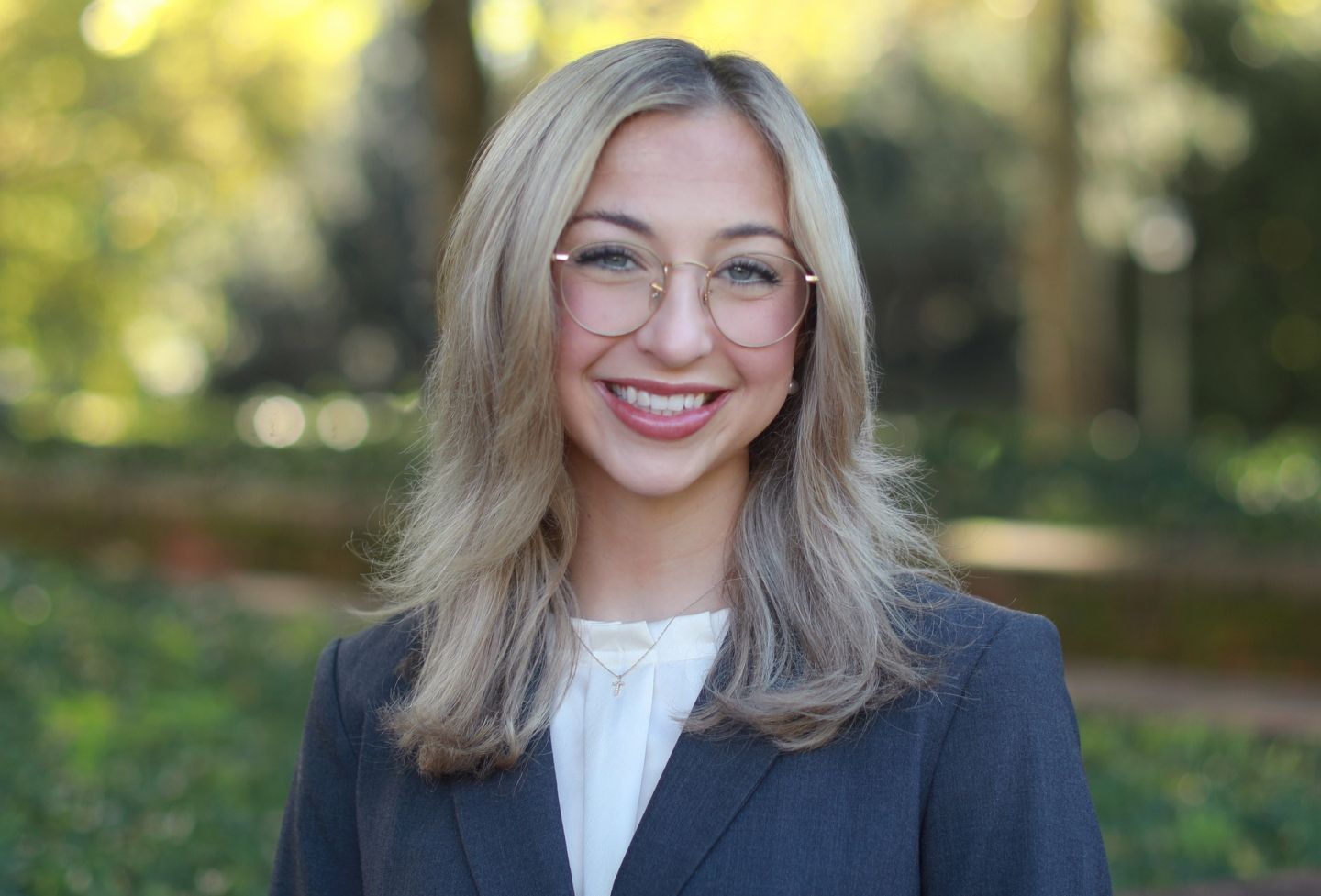First-year students Hannah “Mel” Borja and Carter Farnsworth are this year’s recipients of the Virginia Public Service Scholarships, a full-tuition award given to University of Virginia School of Law students who are pursuing public service careers.
Borja graduated from the University of Virginia in 2019, majoring in global studies with an emphasis on security and justice. The self-described immigration and labor advocate, who hails from Fauquier County, also minored in social entrepreneurship. She put that knowledge to work while starting her own personal finance coaching business as a side job just two years after graduating, both to supplement her government salary and to share what she had learned about living frugally.
Farnsworth, who graduated from Boston University in 2021 with a political science degree, moved to Chicago after college to work as a paralegal on the HIV Legal Project at Legal Aid Chicago. Ultimately, he managed the project, which provides the full scope of civil legal services to low-income Chicagoans living with HIV.
“Mel and Carter have demonstrated an unwavering commitment to protecting some of the most vulnerable members of our communities,” said Leah Gould, assistant dean for public service and director of the Mortimer Caplin Public Service Center. “Between Mel’s entrepreneurial spirit and support for immigrants and workers and Carter’s leadership and advocacy for clients with the HIV Project at Legal Aid Chicago, we are thrilled with the public service experiences they bring to the Law School.”
The daughter of an Ecuadorian father and Puerto Rican mother, Borja said she had planned to attend community college but decided to go to UVA when she was awarded a University Achievement Award, a full-tuition merit scholarship. Even with the scholarship, earnings and other University resources she used to limit her college debt, after graduation she was frustrated by her lack of knowledge and ability to build wealth.
Using YouTube and books created by and for “underrepresented people,” she was able to set up a budgeting and saving system that allowed her to pay off her debt and start investing. When friends and family started asking how she accomplished this, she started an Instagram advice account, @MoneyByMel, which evolved into a business that has coached more than 50 clients, most in their 20s and 30s.
In her most recent full-time job, Borja served as a worker-power policy analyst at the Commonwealth Institute for Fiscal Analysis, advancing labor rights in Virginia. She wrote research briefs and spoke about her research to the media in support of collective bargaining rights in the public sector; she created the first interactive timeline and map of Virginia’s labor history; and she led the campaign to kill a 2023 bill that would have legalized paying youths less than the state minimum wage.
“I worked directly with Virginia AFL-CIO and SEIU [chapters], and other major labor leaders to expand worker rights in the state,” Borja said. “It’s the work I’m most proud of overall, and it’s the work most relevant to why I came to law school and why I chose UVA.”
Before that, she worked full time as U.S. Sen. Tim Kaine’s immigration caseworker for more than two years. She was also appointed by then-Gov. Ralph Northam as the youngest person to serve on the inaugural Office of New Americans Advisory Board, where she was vice chair. On the volunteer board, she served alongside her UVA professor Milton Vickerman, who taught her in his Sociology of Immigration class.
She was a student leader on Latino student issues at UVA, and she spent her final year as a resident of one of the iconic Lawn rooms. The summer before her fourth and final year, she served as a Governor’s Fellow in the Northam administration.
Her first week into the fellowship, the governor signed a budget that included Medicaid expansion. She remembers it as a moment of profound inspiration to continue working to improve the lives of working-class Virginians. She recalls standing in front of the state Capitol building surrounded by advocacy groups, community members and government staff, and recognizing people with whom she had crossed paths in her community organizing work.
“Everyone around me cheered and clapped, and multiple people also cried tears of relief and joy,” Borja said. “Advocates had been pushing for this forever and it was a huge win for working people in the state. I think this moment stands out to me because it was so hopeful — it made me realize that even when the federal government can seem so gridlocked, you can impact a lot of people via state law.”
Borja’s goals as she heads into law school are “centered on supporting working people in Virginia,” she said. “My plans are to deepen my background in either immigration or labor law, and to add to my existing portfolio something that I don’t already have experience with, such as decarceration and community reentry.”
When Farnsworth started his job at Legal Aid Chicago, one of his colleagues told him to remember that people don’t usually apply for free legal services when things are going well in their life.
“Each of my clients come in having experienced significant traumas,” Farnsworth said. “One of the reasons I’m so committed to public interest work is the chance to serve as reliable companion and advocate for my clients in their moments of crisis.”
Farnsworth experienced a moment of crisis himself when he was badly injured in a car accident after he fell asleep on the interstate while driving home from a friend’s house.
“I broke both of my ankles in the crash and had to be dragged away from the car by first responders,” Farnsworth said. “Those first responders were with me the entire night, talking me through what happened and continued to follow up with me throughout my recovery.”
Farnsworth said he “will never forget the stable companionship they offered to me at such a moment of crisis in my life,” and he gravitated toward the legal services job in Chicago for that reason. At first, he helped clients apply for Social Security disability benefits. When he took over management of the project, he touched the full scope of legal services and served on the agency’s Homeless Services Task Force, LGBTQ+ Anti-Violence and Safety Task Force, Disability and Accessibility Task Force, and its committees related to diversity, equity and inclusion.
“New medical advances make it entirely possible for people living with HIV to live a normal life — but only if they have safe and reliable access to income, medical care, housing and food,” Farnsworth said. “Working alongside our clients and my colleagues to address the legal barriers preventing those clients from accessing crucial resources was life-changing.”
Farnsworth is interested in exploring UVA’s health, housing and labor and employment law courses and extracurricular activities, but he is also interested in projects and policies that mitigate the impact of the criminal justice system on marginalized communities. (In college, he was a volunteer tutor for a GED preparation class for incarcerated students and he volunteered for a support and accountability program for formerly incarcerated people reentering the community.)
“Poverty is a monster that does its best to control the lives of entire communities, using myriad systems that are designed to reinforce the symptoms of poverty,” Farnsworth said. “My public service goals are centered around fighting those systems to benefit families like those with whom I worked at Legal Aid Chicago.”
The public service scholarships were launched in 2017 and funded in part with flagship endowments established by Tim ’83 and Lynne Palmer, Ted ’92 and Keryn Mathas, and Dave ’93 and Kelly Burke. They are awarded to two or more first-year students based on their commitment to working as public service lawyers immediately after graduation, their academic excellence and their leadership potential.
Public service scholarship recipients are admitted automatically to UVA Law’s Program in Law and Public Service, which offers intensive training to a select group of students seeking to work in the public interest. The program began 13 years ago under the guidance of now-UVA President Jim Ryan ’92, a former professor and vice dean at the Law School.
Previous Public Service Scholars
Founded in 1819, the University of Virginia School of Law is the second-oldest continuously operating law school in the nation. Consistently ranked among the top law schools, Virginia is a world-renowned training ground for distinguished lawyers and public servants, instilling in them a commitment to leadership, integrity and community service.


